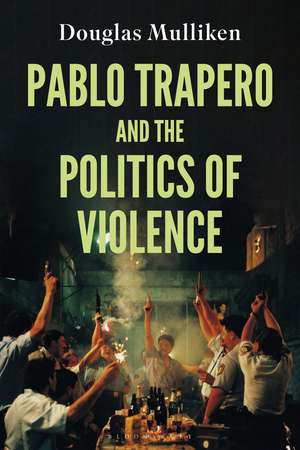Pablo Trapero and the Politics of Violence: World Cinema
Autor Douglas Mullikenen Limba Engleză Paperback – 23 aug 2023
| Toate formatele și edițiile | Preț | Express |
|---|---|---|
| Paperback (1) | 191.92 lei 6-8 săpt. | |
| Bloomsbury Publishing – 23 aug 2023 | 191.92 lei 6-8 săpt. | |
| Hardback (1) | 447.50 lei 3-5 săpt. | +27.96 lei 10-14 zile |
| Bloomsbury Publishing – 9 feb 2022 | 447.50 lei 3-5 săpt. | +27.96 lei 10-14 zile |
Din seria World Cinema
- 13%
 Preț: 176.27 lei
Preț: 176.27 lei - 30%
 Preț: 571.96 lei
Preț: 571.96 lei - 30%
 Preț: 539.18 lei
Preț: 539.18 lei - 23%
 Preț: 193.87 lei
Preț: 193.87 lei - 15%
 Preț: 775.79 lei
Preț: 775.79 lei - 30%
 Preț: 714.51 lei
Preț: 714.51 lei - 21%
 Preț: 219.09 lei
Preț: 219.09 lei - 30%
 Preț: 541.85 lei
Preț: 541.85 lei - 30%
 Preț: 513.71 lei
Preț: 513.71 lei - 19%
 Preț: 470.32 lei
Preț: 470.32 lei - 30%
 Preț: 543.51 lei
Preț: 543.51 lei - 20%
 Preț: 219.19 lei
Preț: 219.19 lei - 30%
 Preț: 539.18 lei
Preț: 539.18 lei - 30%
 Preț: 714.12 lei
Preț: 714.12 lei - 22%
 Preț: 227.88 lei
Preț: 227.88 lei - 30%
 Preț: 511.40 lei
Preț: 511.40 lei - 30%
 Preț: 716.56 lei
Preț: 716.56 lei - 13%
 Preț: 166.36 lei
Preț: 166.36 lei - 30%
 Preț: 774.64 lei
Preț: 774.64 lei - 24%
 Preț: 189.92 lei
Preț: 189.92 lei - 9%
 Preț: 169.83 lei
Preț: 169.83 lei -
 Preț: 166.82 lei
Preț: 166.82 lei - 18%
 Preț: 167.24 lei
Preț: 167.24 lei - 14%
 Preț: 165.66 lei
Preț: 165.66 lei - 23%
 Preț: 194.41 lei
Preț: 194.41 lei - 23%
 Preț: 197.68 lei
Preț: 197.68 lei - 23%
 Preț: 198.40 lei
Preț: 198.40 lei - 18%
 Preț: 161.04 lei
Preț: 161.04 lei - 18%
 Preț: 154.50 lei
Preț: 154.50 lei - 21%
 Preț: 217.17 lei
Preț: 217.17 lei - 30%
 Preț: 716.17 lei
Preț: 716.17 lei - 21%
 Preț: 218.54 lei
Preț: 218.54 lei - 26%
 Preț: 597.22 lei
Preț: 597.22 lei - 25%
 Preț: 772.98 lei
Preț: 772.98 lei
Preț: 191.92 lei
Preț vechi: 249.67 lei
-23% Nou
Puncte Express: 288
Preț estimativ în valută:
36.72€ • 38.45$ • 30.39£
36.72€ • 38.45$ • 30.39£
Carte tipărită la comandă
Livrare economică 05-19 aprilie
Preluare comenzi: 021 569.72.76
Specificații
ISBN-13: 9781350290150
ISBN-10: 1350290157
Pagini: 264
Ilustrații: 29 bw illus
Dimensiuni: 156 x 234 x 25 mm
Greutate: 0.37 kg
Editura: Bloomsbury Publishing
Colecția Bloomsbury Academic
Seria World Cinema
Locul publicării:London, United Kingdom
ISBN-10: 1350290157
Pagini: 264
Ilustrații: 29 bw illus
Dimensiuni: 156 x 234 x 25 mm
Greutate: 0.37 kg
Editura: Bloomsbury Publishing
Colecția Bloomsbury Academic
Seria World Cinema
Locul publicării:London, United Kingdom
Caracteristici
A unique focus on the function and representation of violence in Trapero's cinema, linking it to social injustice, the power of the State, and the family
Notă biografică
Douglas Mulliken received his PhD from the School of Modern Languages and Cultures at the University of Glasgow, UK. He holds master's degrees from the University of Virginia and the University of Cape Town. In addition to his work on Argentina, he has published on Mozambican cinema.
Cuprins
IntroductionA History of ViolenceA Hauntology of ViolenceThe Changing Nature of Political FilmNeoliberalism and IdeologyA Cyclical CareerPart I: The Individual and the State1. Neoliberalism, Violence, and the New Argentina1.1 The Violence of NeoliberalismFrom Objective to Subjective ViolenceMasculinity in Crisis1.2 Mundo GrúaThe Precariat on ScreenPhysical and Emotional Estrangement1.3 CaranchoWhat is Shown, What is NotResistance and the Middle ClassMargani v. DarínResponse to Violence2. Repression, Ideology, and the Manipulation of Power2.1 Theories of Power2.2 El BonaerenseEl Conurbano"La Bonaerense"Police Repressive State ApparatusZapa2.3 Elefante BlancoCiudad Oculta and the Catholic ChurchAuthority and the Legacy of MugicaState Violence and DeathPart II: Violence and the Family3. The Violence of the Arborescent Family3.1 Theories of the FamilyFamily and ControlFamily as Source of Violence3.2 Familia RodanteThe Potent Symbolism of the FamilyThe Family as a Locus of RetentionDiscipline and Rebellion3.3 El ClanAdult Paranoiacs, Child NeuroticsThe Violence of the Family4. The Rhizome as Alternative Family Model4.1 Rhizomes and the becoming-familyPrison: Arborescent or Rhizomatic?The State of Exception4.2 Nacido y CriadoDesaparecidosHomo Sacer and the State of ExceptionPatagonia and Rhizomes4.3 LeoneraPrison and Prison FilmsRhizomatic FamiliesConclusionAppendix: Interview with Pablo Trapero
Recenzii
Pablo Trapero and the Politics of Violence is the first serious examination of the oeuvre of one of Argentina most important contemporary filmmakers. The author offers meticulous analyzes of Trapero's films that cohere around the topic of violence, providing an exploration of Argentine culture that is both timely and well-conceived.
